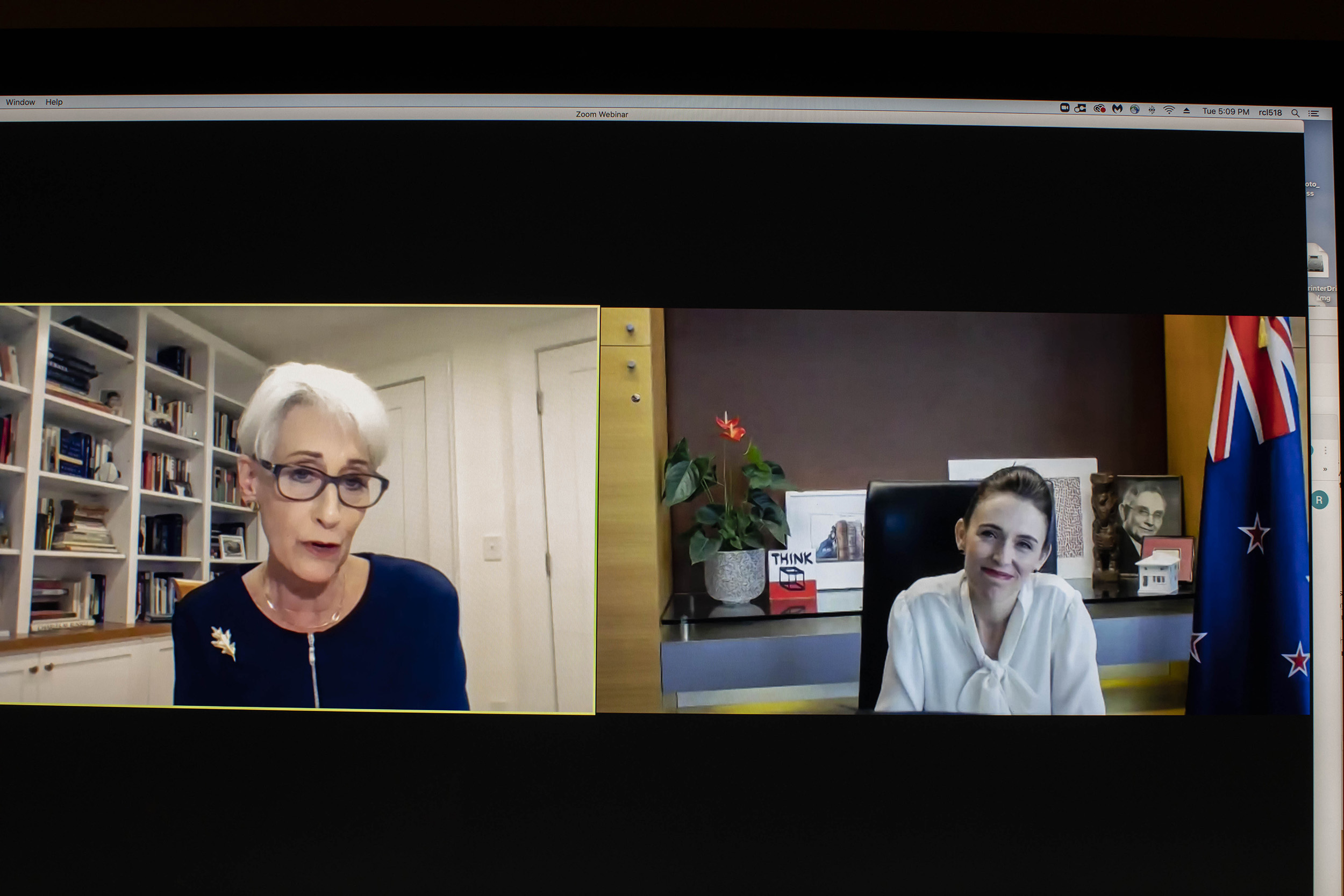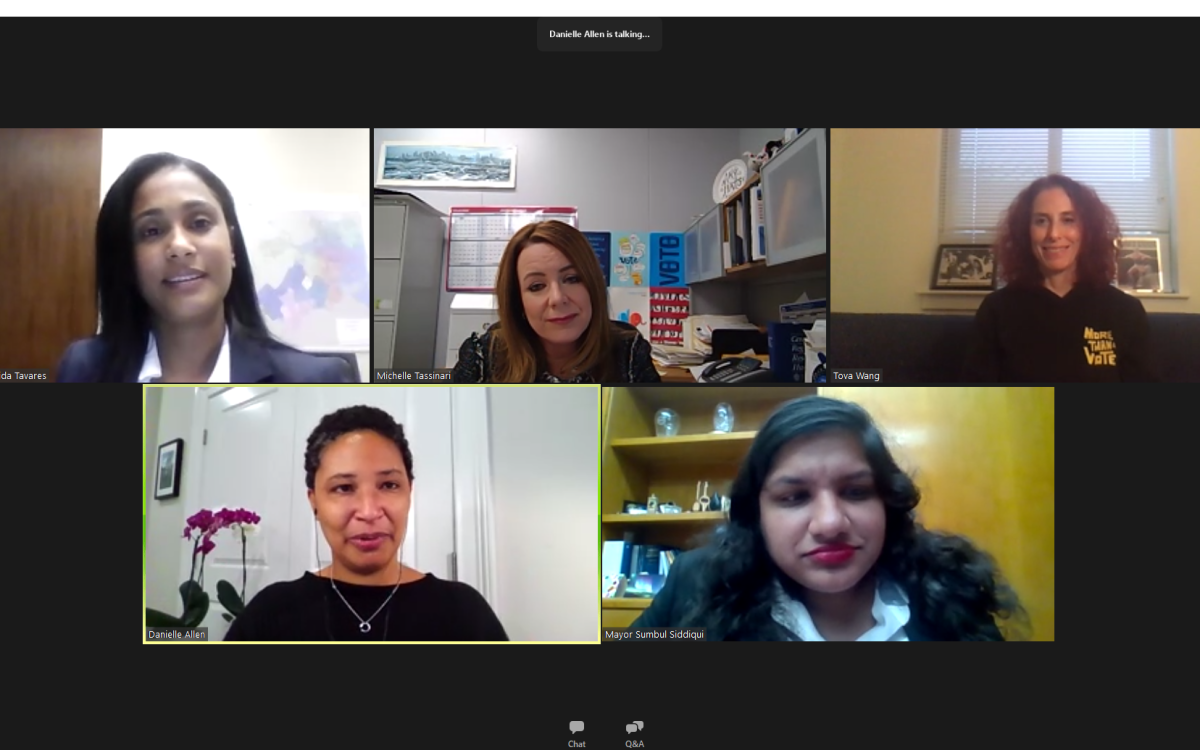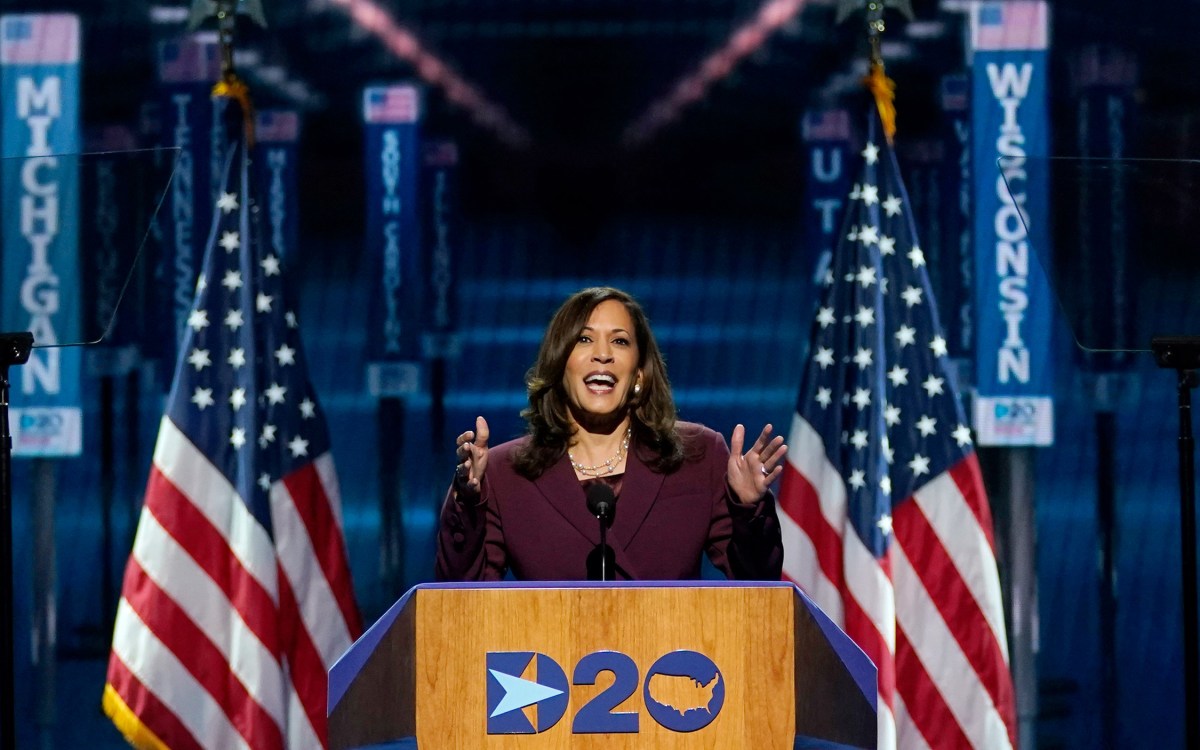
Center for Public Leadership director Wendy R. Sherman (left) spoke with Prime Minister Jacinda Ardern, who received the Gleitsman Award.
Rose Lincoln/Harvard Staff Photographer
Principled yet just, pragmatic yet idealistic — and nice
New Zealand Prime Minister Jacinda Ardern, who won the Gleitsman activist award, recounts her rise, battle against COVID-19
People say Jacinda Ardern, prime minister of New Zealand, doesn’t come across like a typical world leader — and she’s OK with that.
The self-described “pragmatic idealist” is considered neither brash nor arrogant and doesn’t need the spotlight on her at all times. Instead, she’s known for her modesty and competence, and for demonstrating that successfully leading a country through a crisis, or even two, doesn’t mean you can’t also be a kind and compassionate person.
On Tuesday, Ardern received this year’s Gleitsman International Activist Award from Harvard Kennedy School’s Center for Public Leadership (CPL). Recently elected to a second term, she was honored for her role in guiding New Zealand through the March 2019 terrorist mosque attacks in Christchurch and the coronavirus pandemic; policies on climate change, inclusivity, and social well-being; and “principled, effective, and just leadership.”
Shortly before announcing that all New Zealand public sector agencies will become carbon-neutral by 2025, Ardern accepted the award virtually, speaking from her office in the executive wing building in Wellington known as the Beehive.
During a conversation with former U.S. Ambassador Wendy R. Sherman, director of the CPL, she discussed how she’s managed some of the challenges of leadership, including those posed by the pandemic. She also talked about how being a woman and gender stereotypes have affected her confidence and leadership decisions, and she offered advice to young people wondering whether going into politics requires checking kindness, empathy, and humility at the door. (It doesn’t, she said.)
Known for her consensus-building style and firm belief in science, Ardern explained that her decision in March to initiate a strict nationwide lockdown was intended to not just stop the spread of the coronavirus but eliminate it. The move, she said, was informed by staying attuned to what she saw and heard and felt from people as she walked between the prime minister’s residence and her office every day. New Zealand, which has population of 4.9 million, has one of the world’s lowest COVID infection rates, with only 25 deaths and less than 2,000 confirmed cases. Though the island nation’s remote location in the southwest Pacific Ocean undoubtedly helped, experts have credited the government’s swift and stringent response as a key factor.
“It’s been a journey for me. I want to be a good leader, not a good female leader.”
Jacinda Ardern
Asked about how she’s dealt with sexism, Ardern recalled a political cartoon that depicted her in a bikini and high heels standing in a boxing ring with a card signaling a new round when she was still a relatively new member of Parliament. The commentary implied that the Labour Party had only given her a front bench role because of her looks.
“It was pretty demeaning and pretty awful,” she said. Worried that she’d be cast in the press as stereotypically humorless or overly sensitive if she reacted negatively, Ardern said she chose to passively swat away that and other sexist remarks aimed at her. But over time, she began to question why she was taking this approach and whether it unintentionally sent the wrong message.
“I started to wonder about what other young women would think if they saw some of that treatment and think that if they went into politics, they would experience some of that, too, [so] maybe I did need to speak up,” she said.
“It’s been a journey for me. I want to be a good leader, not a good female leader,” said Ardern, who received global attention in 2018 as the second head of state, after the late Benazir Bhutto of Pakistan, to give birth while in office. “But I also take very seriously the responsibility that I cannot just ignore those things when they happen. Other women are watching; young girls are watching.”
One of the youngest world leaders, Ardern, 40, said she often speaks to students and knows how important it is for there to be diversity in political leaders — not just in age, race, ethnicity, religion, sexual orientation, but also leadership style.
If the gray-haired, white, male politician who’s loud, aggressive, and hyper-ambitious is the default image of politics and leadership for most people, that reinforces the false notion that these must be the character traits necessary to survive and succeed.
“And if that is what we’ve come to expect, is it any wonder that our young people have in the past shied away from believing that [government] is a place they want to be or indeed they can be?” she said. “I wonder this because I believed it myself.”
Ardern entered politics in 2008 and nine years later became deputy leader, then leader of the Labour Party, and prime minister. Voted most likely to be prime minster by her high school classmates, she said she never envisioned ending up in this position less than two decades later, but not because of gender — New Zealand had already had two female heads of state.
“There was never a point in my life that I can recall where I thought, ‘I can’t do that because I’m a woman.’ However I have on many occasions thought, ‘I cannot do that because it’s me.’ Imposter syndrome is real,” she said.
So for young people who hope to hold political office or positions of leadership someday, particularly girls, Ardern said she counsels them to grab promising opportunities whenever they come, even if the timing is unexpected or they think their resumé isn’t perfect yet.
“Don’t wait for the moment when you suddenly feel you are ready. Sometimes that moment won’t come. We need to accept opportunities, take them and be bold — despite that feeling of fear and doubt,” she said.
The Gleitsman award, which began in 1993, recognizes international figures and Americans who demonstrate and inspire positive social change around the world. Past winners include Nobel Peace Prize winner Malala Yousafzai (2018), Rep. John Lewis (2017), and Nelson Mandela (1993).
Ardern requested that the award’s $150,000 prize be used to fund a scholarship for a New Zealand citizen attending the Kennedy School.







